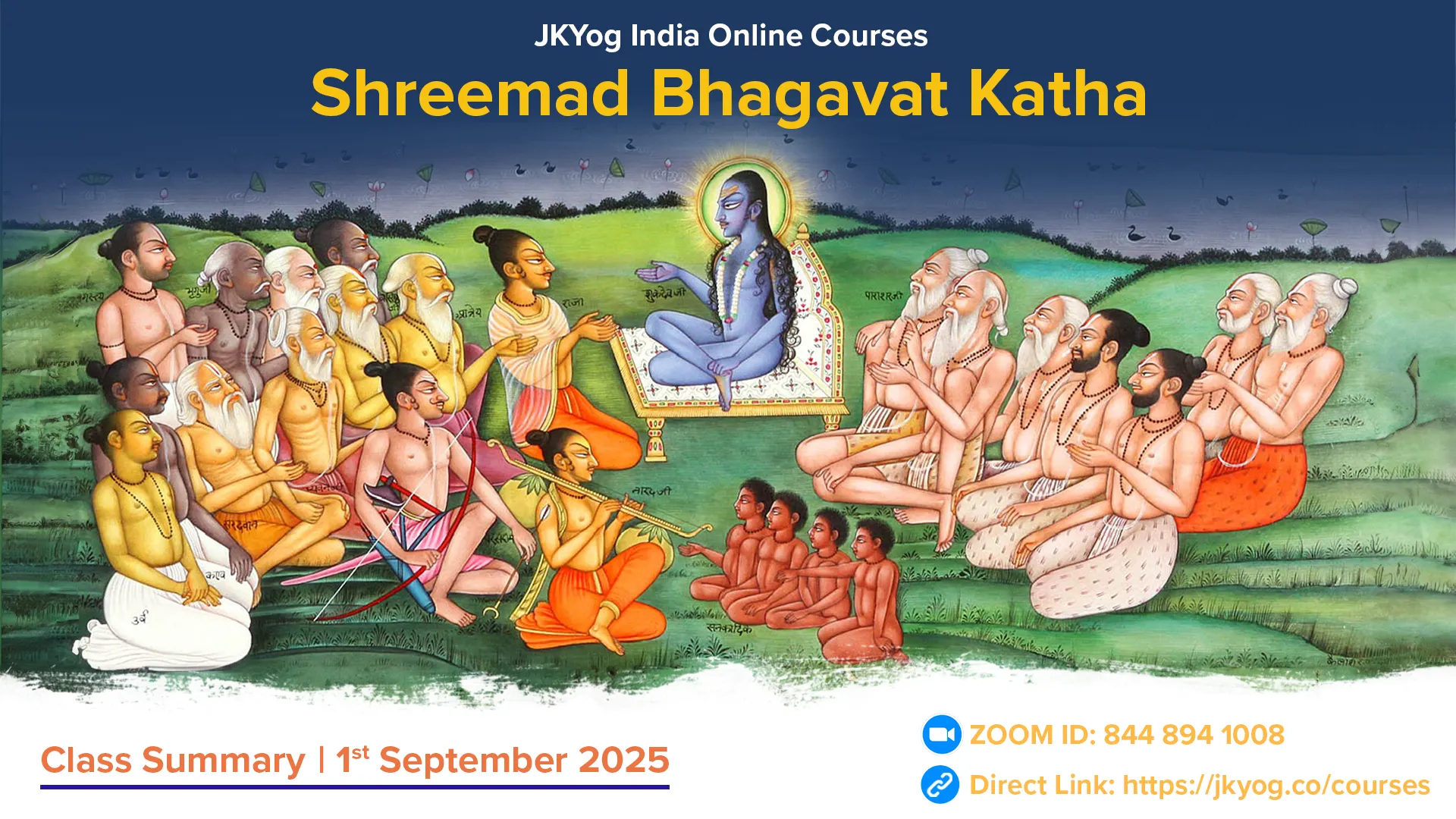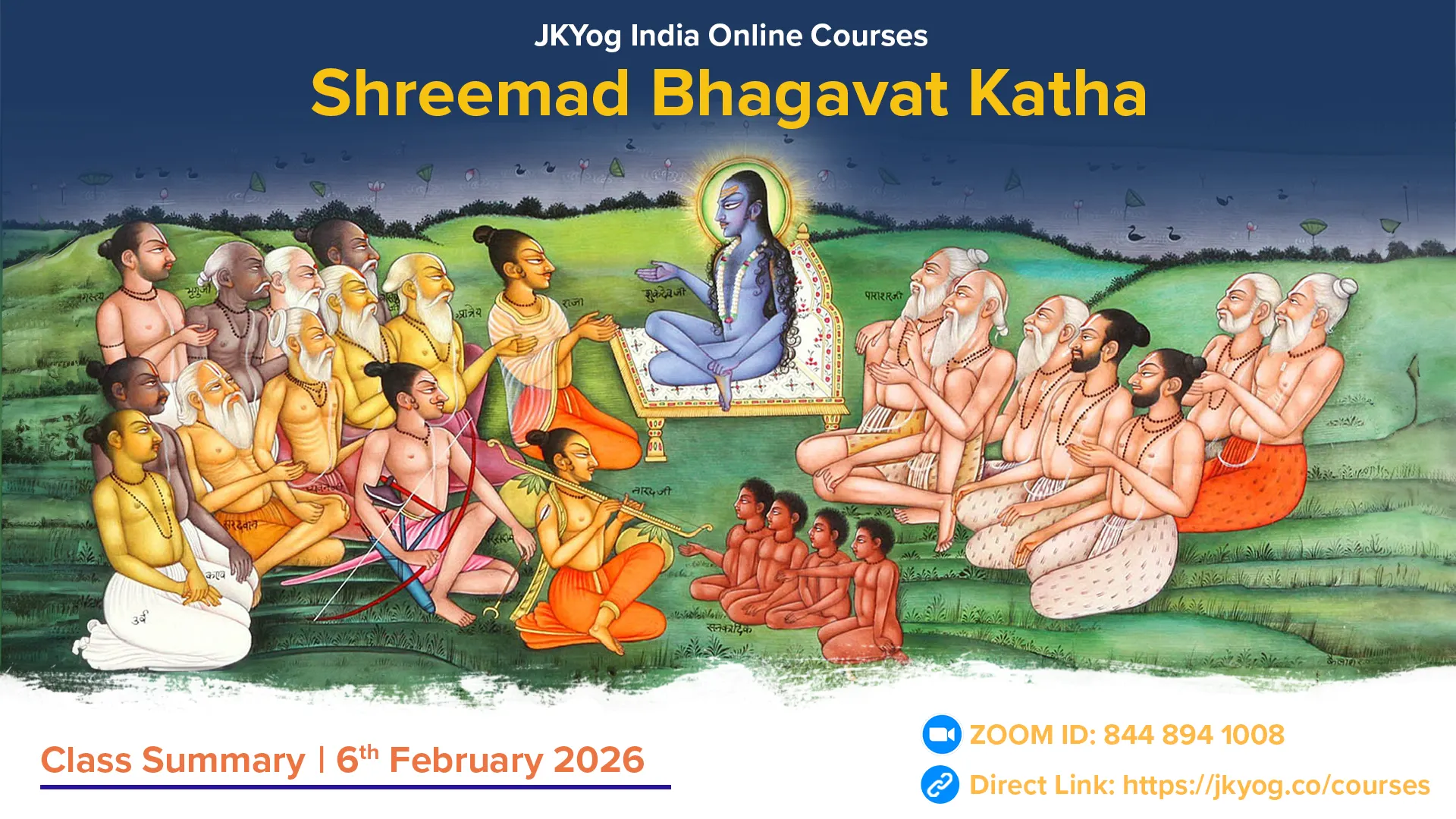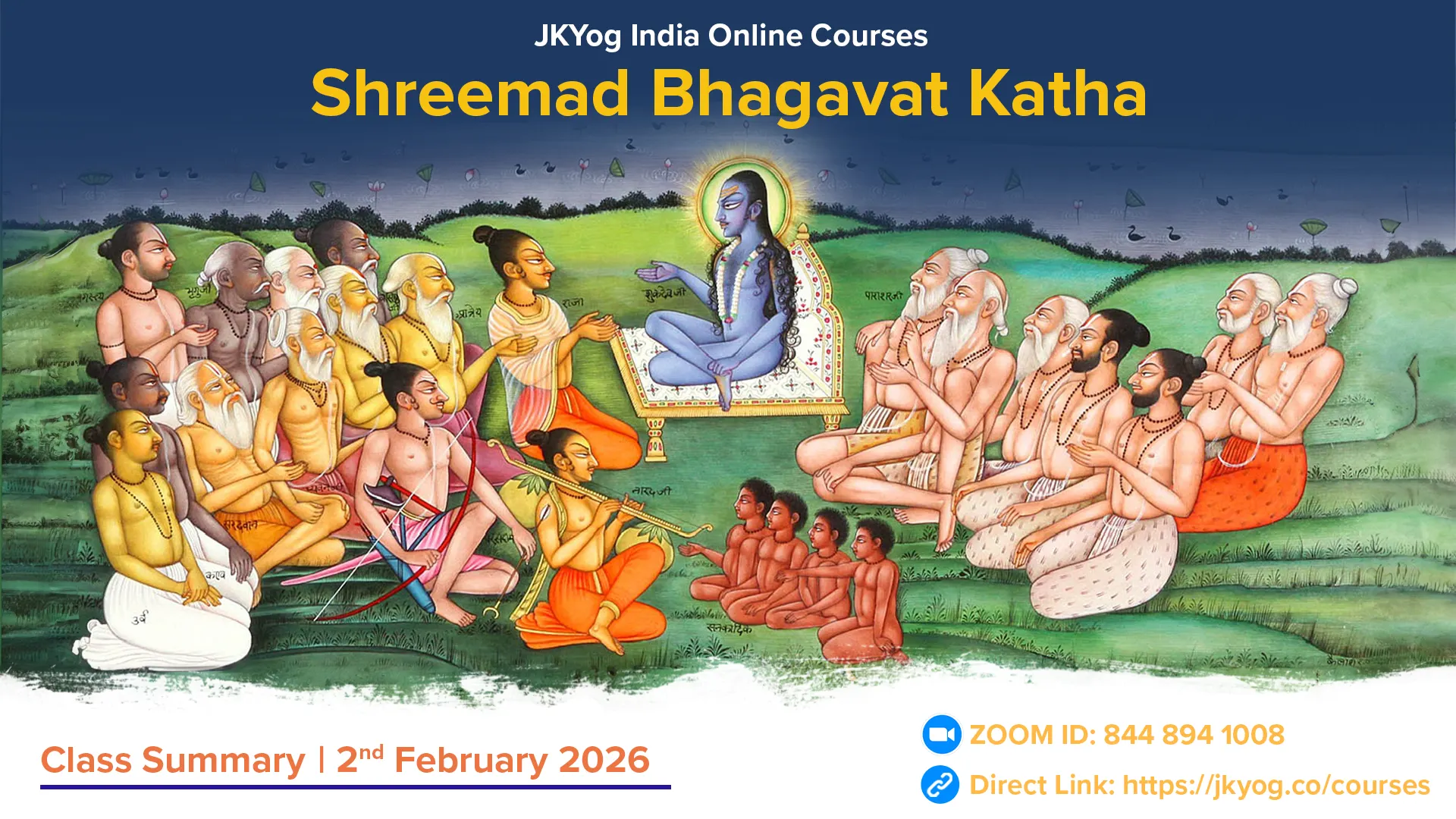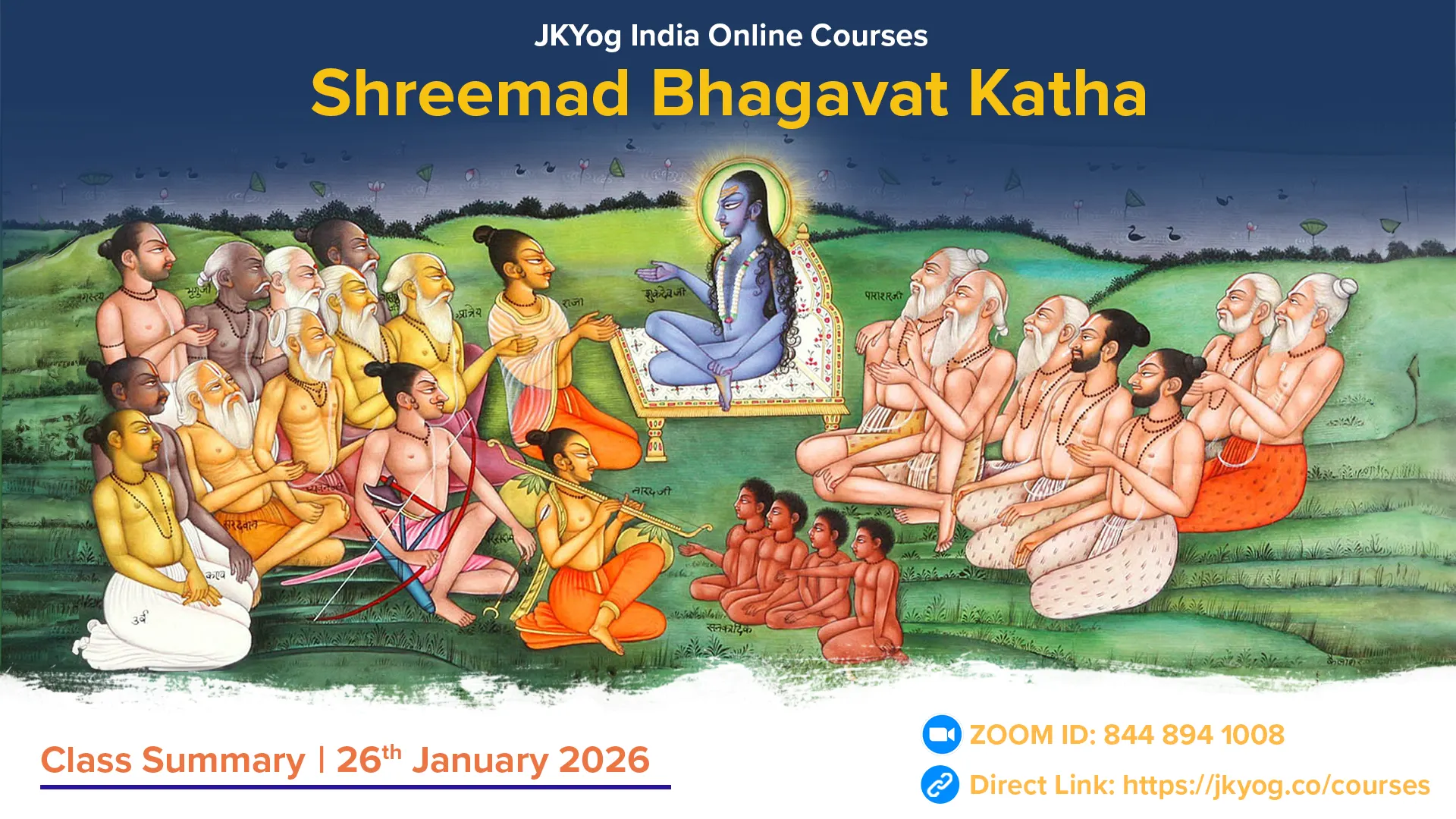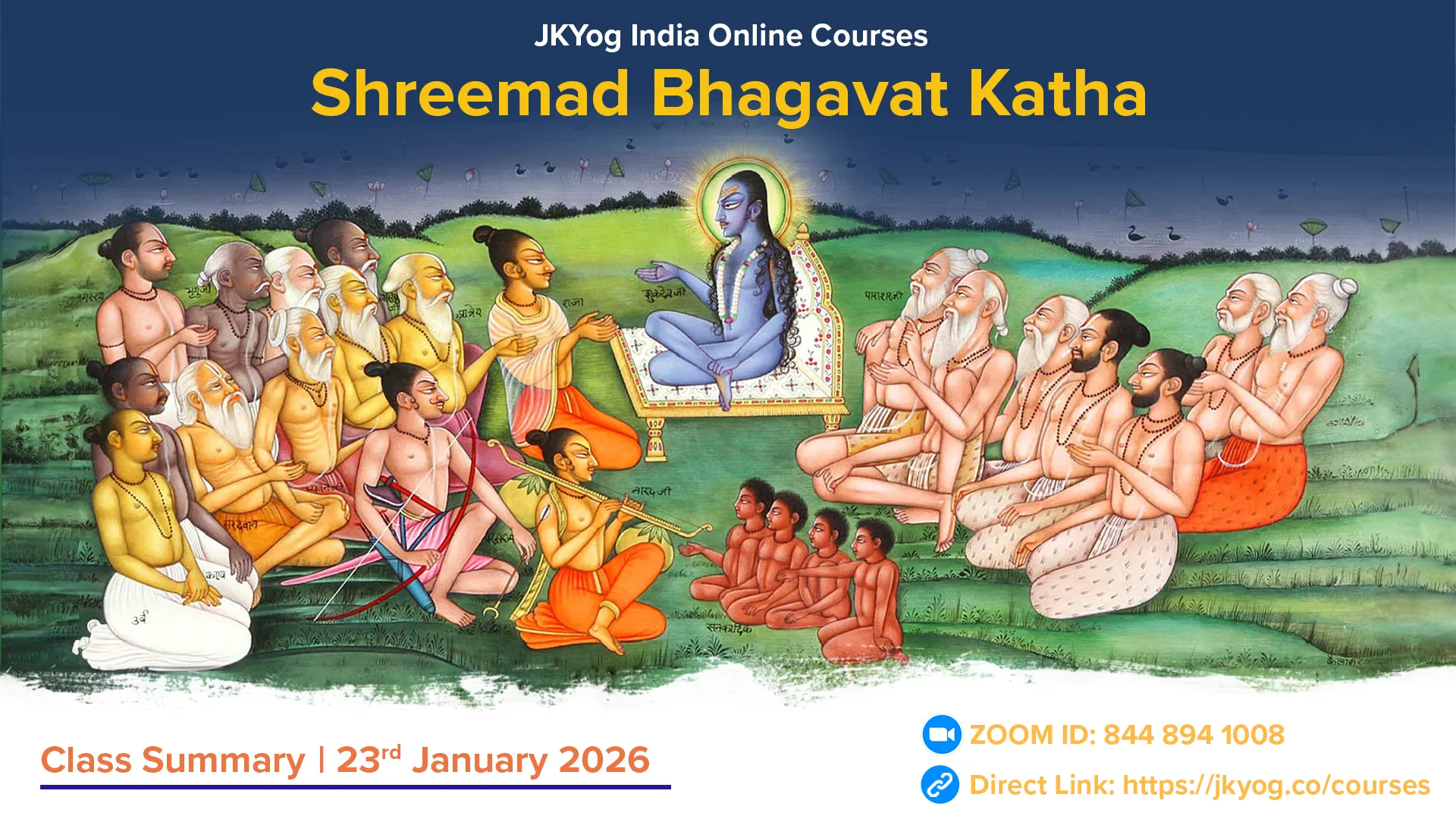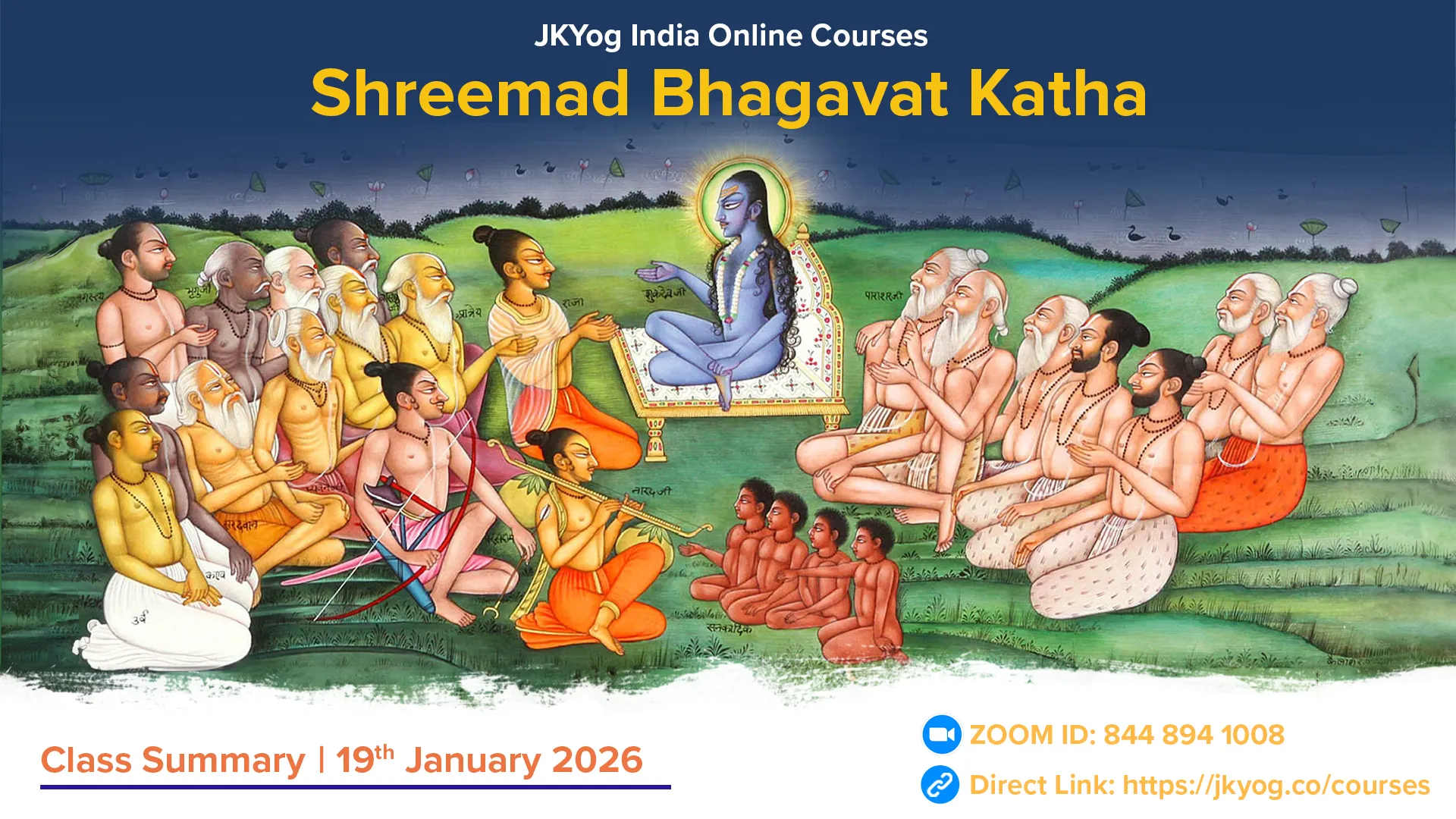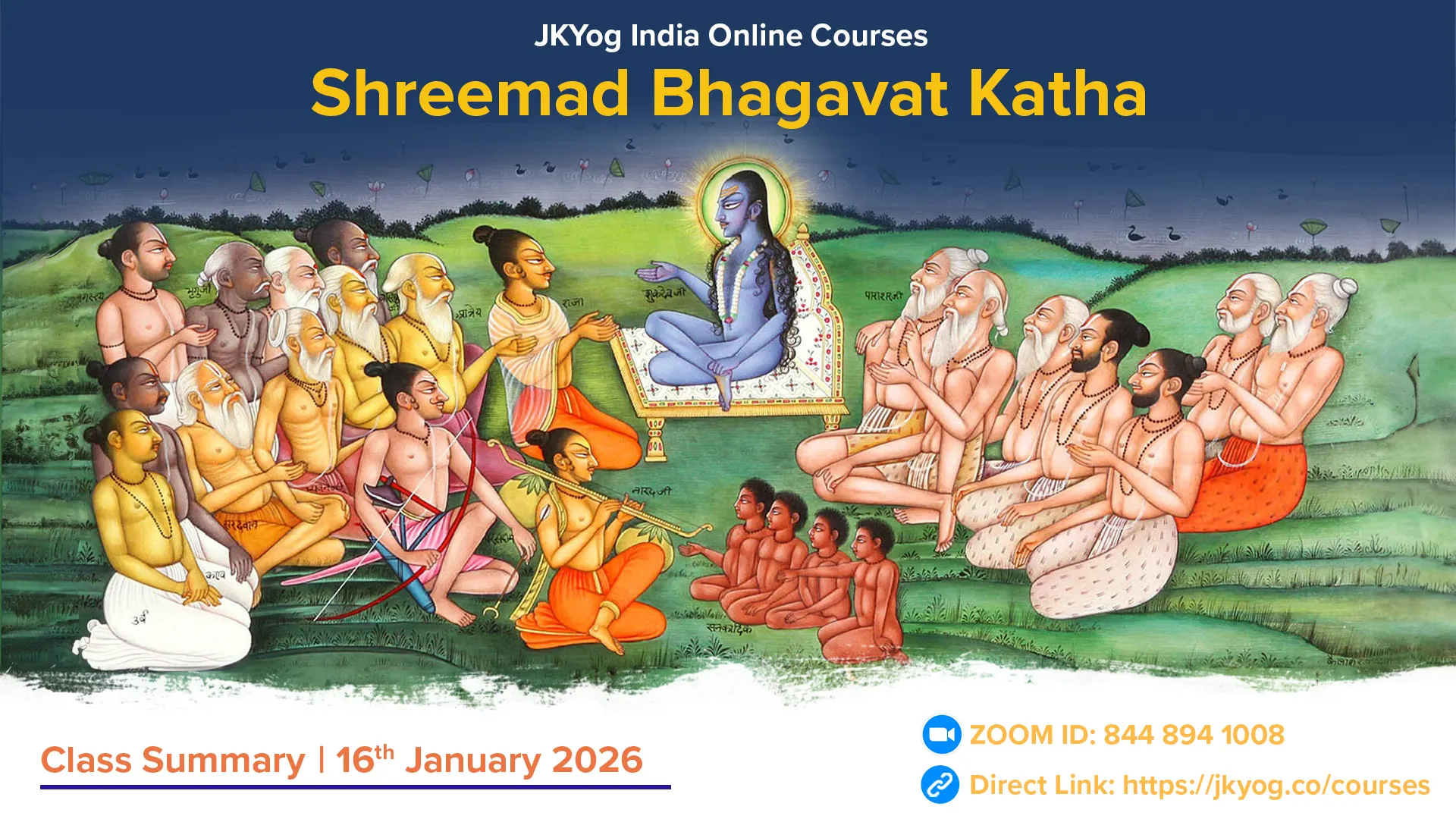Shreemad Bhagavat Mahapuran- Canto: 9, Chapters: 15-17
Shree Shukadevaji tells Parikshit that from Urvashi’s womb, Pururava had six sons: Ayu, Shrutayu, Satyayu, Ray, Vijaya, and Jaya.
Shrutayu’s son was Vasuman, and Satyayu’s son was Shrutanjaya. Ray’s son was Eka, while Jaya’s son was Amit. Vijaya’s lineage continued through Bhima; Bhima’s son was Kanchana, Kanchana’s son was Hotra, and Hotra’s son was the illustrious sage Jahnu. This very Jahnu is renowned for having drunk the waters of the Ganga in the hollow of his palms.
Jahnu’s son was Puru, Puru’s son was Balaka, and Balaka’s son was Ajaka. Ajaka’s son was Kusha, who had four sons—Kushambu, Tanaya, Vasu, and Kushanabha. From Kushambu was born Gadhi.
The Birth Story of Parashurama
Shree Shukadevaji further tells Parikshit that Gadhi had a daughter named Satyavati. Richeeka, the son of Bhrigu, asked Gadhi for her hand in marriage. But Gadhi thought that this sage was not a worthy match for his daughter. So he set a condition, ‘O great sage! It is very difficult to obtain my daughter. You must bring me a thousand horses whose bodies are completely white, but each of which has one ear that is black in colour.’
Richeeka Muni went to Varun Dev, procured such horses, gave them to Gadhi, and thus married Satyavati.
After some time, both Satyavati and her mother desired to have sons and prayed to Richeeka Muni. The sage accepted their request, prepared charu (a sacred food offering, cooked and meant to be offered into the sacrificial fire for the deities) with different mantras for each of them, and then went to bathe.
Meanwhile, Satyavati’s mother thought, ‘Surely the sage must have prepared the better charu for his wife.’ Thinking so, she asked her daughter for it. Out of selfless devotion, Satyavati gave her own charu to her mother, and herself ate the one meant for her mother.
When Richeeka Muni returned and learned of this, he said, ‘You have committed a great blunder! Now, your son will be of fierce and terrible nature, while your brother will be a great knower of Brahman.’
Satyavati pleaded, ‘O Master! Let it not be so.’
The sage then said, ‘Very well, not your son but your grandson will be of fierce nature.’
In due time, Satyavati gave birth to Jamadagni. Later, Satyavati herself became the holy and purifying river Kausiki.
Shree Shukadevaji continues—
Jamadagni married Renuka, the daughter of Renu Rishi. From her womb were born many sons, of whom the youngest was Parashuram. His fame spread throughout the world.
Jamadagni married Renuka, the daughter of Renu Rishi. From her womb were born many sons, of whom the youngest was Parashuram. His fame spread throughout the world.
It is said that to bring an end to the Haihaya dynasty, the Supreme Lord Himself descended as Parashurama. He rid the earth of the Kshatriyas twenty-one times.
Hearing this, King Parikshit asks, ‘O Bhagavan! The Kshatriyas may indeed have become greedy and given to sense-enjoyment, but what great fault did Parashuram see in them that He killed them again and again?’
Shree Shukadevaji replies, “At that time, the king of the Haihayas was Arjun, who was known as Sahasrabahu (the one with a thousand arms). By serving Bhagwan Dattatreya, an incarnation of Narayan, he had obtained the boon of a thousand arms, invincibility, extraordinary strength, immense wealth, and yogic powers. He could assume whatever form he desired and roamed everywhere freely like the wind.”
Parashuram and the Defeat of Sahasrabahu Arjun
One day, Sahasrabahu Arjun was enjoying himself in the waters of the Narmada River with many women. With the power of his thousand arms, he blocked the river’s flow.
Nearby, Ravan’s camp was set up. When the water turned back, his camp began to drown. Angry, Ravan came to confront Arjun. But Sahasrabahu, in arrogance, caught him playfully and carried him off to his capital, Mahishmati. Only after Pulastya intervened was Ravan released.
Another time, while hunting, Sahasrabahu came to the hermitage of Sage Jamadagni. There lived the divine cow, Kamadhenu, whose power enabled the sage to feed the king and his entire army with ease.
But Arjun, filled with pride, thought, “This sage’s wealth and power surpass my own!” Out of arrogance, he ordered his men to seize Kamadhenu and her calf.
When Parashuram returned and heard of this insult, he burned with rage. He lifted his axe, bow, and arrows, and chased after Sahasrabahu. The mighty king sent forth his massive army of seventeen divisions. But Parashuram alone destroyed them all.
At last, Sahasrabahu himself came to fight. With his thousand arms, he shot hundreds of arrows at once. Yet Parashuram cut down every one of them. Then, when Sahasrabahu hurled mountains and trees, Parashuram struck swiftly with his axe, severing his arms one after another. Finally, he cut off Arjun’s head. Terrified, his ten thousand sons fled.
Parashuram brought Kamadhenu back to his father and told him everything.
But Sage Jamadagni sighed and said, “Alas, Ram! You have committed a grave sin. We Brahmins are respected because of our forgiveness. To kill a king who embodies all the gods is even more sinful than killing a Brahmin. Go now, remember God, and atone by visiting the holy places.” Obeying his father’s words, Parashuram went on a pilgrimage for a year before returning to his hermitage.
When Parashuram Obeyed His Father and Slew His Mother
One day, Mother Renuka went to the banks of the Ganga to fetch water. There she saw King Chitrarath, the Gandharva, sporting in the river with apsaras. Renuka became absorbed in watching this sight and forgot the time for her husband’s sacred fire ritual. For a brief moment, her mind was also drawn towards Chitrarath.
When she remembered that the time for the fire sacrifice had passed, she grew afraid. She quickly filled her water pot and returned to the hermitage, placing it before her husband, Sage Jamadagni.
The sage, with his spiritual insight, understood his wife’s mental lapse. Enraged, he commanded his sons, “My sons! Kill this sinful woman.”
But none of the sons obeyed.
Then, out of obedience to his father’s word, Parashuram raised his axe and struck down his mother and even his brothers, too. He knew the power of his father’s tapas and yogic strength; he trusted that this terrible act would not be without purpose.
Seeing this, Sage Jamadagni was pleased and said, “My son, ask for a boon.”
Parashuram bowed and said, “Father, let my mother and brothers come back to life, and let them not remember that I was the one who slew them.”
The moment he spoke, all of them rose as if waking from a deep sleep, alive and unharmed, with no memory of what had happened.
Parashuram and the Slaying of the Wicked Kshatriyas
The sons of Sahasrabahu Arjun, who had fled from the battlefield, could not overcome the grief of their father’s death. Burning with revenge, they came one day when Parashuram was away from the hermitage with his brothers.
At that time, Sage Jamadagni was seated in the sacred fire-hall, absorbed in meditation on God. The wicked Kshatriyas attacked mercilessly and killed him. Mother Renuka wept and pleaded with them, but they ignored her cries. With cruelty, they cut off the sage’s head and carried it away.
Distraught, Renuka cried aloud, “Parashuram! My son, come quickly!”
Far away, Parashuram heard his mother’s anguished call. In great haste, he ran back to the hermitage, only to see his father slain.
Overcome with grief, he entrusted his father’s body to his brothers and, taking up his axe, made a solemn vow to annihilate the Kshatriyas.
He marched to Mahishmati, the city of Sahasrabahu, and destroyed the sons of Arjun. He piled their severed heads into a mountain at the city’s centre. From their blood, a dreadful river began to flow.
Not once, but twenty-one times, Parashuram wiped the earth clean of Kshatriyas. At Kurukshetra, in Samantapanchaka, he formed five great lakes filled with their blood.
After this, Parashuram rejoined his father’s head to his body and performed sacred yajnas. When the rites were complete, he bathed and shone like the sun on the banks of the Saraswati River.
Sage Jamadagni, through divine grace, obtained a subtle form made of memory and will, and was elevated to the circle of the Saptarishis.
Parashuram himself, in the coming Manvantara, will dwell among the Saptarishis to expand the knowledge of the Vedas.
Even today, Parashuram resides peacefully on Mount Mahendra, where the Siddhas, Gandharvas, and Charanas sing his glory.
The Lineage of Sage Vishwamitra
After this, Shree Shukadevaji says- Gadhi’s son was the supremely radiant Vishwamitra. By the power of his tapas, he renounced his Kshatriya-hood and attained the splendour of Brahman.
Vishwamitra had a hundred sons. Among them, the middle son was named Madhuchhanda, and so all his brothers came to be called by the same name.
Vishwamitra accepted his nephew, Shunahshepa (Devarat), as his own son and said to his children, “You must all regard him as your elder brother.”
This Shunahshepa was the very one who had been made the yajna pashu in King Harishchandra’s yajna. But Vishwamitra, through prayer to the gods, delivered him. The gods themselves gave Shunahshepa to Vishwamitra as a son, and hence he was called Devarat—‘the one given by the gods.’
But the elder sons refused to accept him as their elder brother. Enraged,
Vishwamitra cursed them, “Wicked ones! You shall all become mlecchas (outcast tribes).”
Thus, forty-nine of his sons became mlecchas. Then Madhuchhanda, together with the younger brothers, said, “Let us obey father. We accept Devarat as our elder brother.”
Pleased, Vishwamitra said, “My sons, by honouring my word, you have preserved my dignity. May you, too, be blessed with noble sons. From now on, Devarat belongs to your own gotra. Follow his authority.”
In this way, from the descendants of Vishwamitra, many branches arose within the Kaushika gotra and Devarat (Shunahshepa).
The Lineage of Pururava
Shree Shukadevaji says, “O Parikshit, Pururava had a son named Ayu. Ayu had five sons— Nahusha, Kshatravriddha, Raji, the mighty Rambha, and Anena.
Now hear the lineage of Kshatravriddha. His son was Suhotra. Suhotra had three sons— Kashya, Kusha, and Gritsamada.
Gritsamada’s son was Shaunaka, and Shaunaka’s son was the great sage Shaunaka, foremost among the seers of the Rigveda.
Kashya’s son was Kashi; Kashi’s son was Kashika; Kashika’s son was Rashtra; Rashtra’s son was Dirghatama; and Dirghatama’s son was Dhanvantari.
This Dhanvantari is the originator of Ayurveda. He is a portion of Bhagavan Vasudeva Himself, and he is entitled to a share in the yajnas. By the mere remembrance of his name, all kinds of diseases are destroyed.
Dhanvantari’s son was Ketuman; Ketuman’s son was Bhimaratha; Bhimaratha’s son was Divodasa; and Divodasa’s son was Dhumaana, also known as Pratardana. This Dhumaana was also famous by other names— Shatrujit, Vatsa, Ritadhvaja, and Kuvalayashva. His son was Alarka, and others.
O Parikshit! Except for Alarka, no king on earth ever enjoyed youthful vigour and ruled the kingdom for sixty-six thousand years.
Alarka’s son was Santati; Santati’s son was Sunitha; Sunitha’s son was Suketana; Suketana’s son was Dharmaketu; and Dharmaketu’s son was Satyaketu.
From Satyaketu came Dhrishtaketu, from Dhrishtaketu came King Sukumara, from Sukumara came Vitihotra, from Vitihotra came Bharga, and from Bharga was born King Bhargabhoomi.
All of these were kings born in the line of Kashi, descended from Kshatravriddha.
Rambha’s son was Rabhasa; Rabhasa’s son was Gambhira; and Gambhira’s son was Akriya. From Akriya’s wife a line of Brahmanas arose.
Now hear the lineage of Anena. Anena’s son was Shuddha; Shuddha’s son was Shuchi; Shuchi’s son was Trikakuda; and Trikakuda’s son was Dharmasarathi. Dharmasarathi’s son was Shantaraya, who, being self-realised, had attained fulfilment and desired no progeny.
Ayu’s son Raji had five hundred very powerful sons. At the request of the gods, Raji slew the Daityas and restored the kingdom of heaven to Indra. But Indra, still fearful of Prahlad and others, gave that kingdom back to Raji, grasping his feet and placing his own protection in Raji’s hands.
When Raji died, his sons refused to return the heavens to Indra, even when he asked for them. Instead, they began to claim the shares of sacrifice for themselves.
Then, at Indra’s prayer, their guru Brihaspati performed a ritual of abhichara (a destructive rite). Thus, Raji’s sons deviated from the path of Dharma, and Indra easily slew them all. Not one remained alive.
From Kshatravriddha’s grandson Kusha came Prati, from Prati came Sanjaya, and from Sanjaya came Jaya. Jaya’s son was Krita; Krita’s son was King Haryavana; Haryavana’s son was Sahadeva; Sahadeva’s son was Hina; and Hina’s son was Jayasena.
Jayasena’s son was Sankriti, and Sankriti’s son was the great warrior Jaya, a hero of heroes.
Thus, O King, in the line of Kshatravriddha, these were the royal descendants.”
Summary: JKYog India Online Class- Shreemad Bhagavat Katha [Hindi]- 01.09.2025

